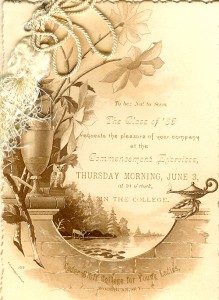So declared the motto on the 1886 commencement invitation for Cedar Bluff College in Woodburn, Kentucky, a boarding school that educated young ladies from 1864 until fire destroyed its building in 1892.
In June 1877, Addie Darden was class salutatorian, and her greeting to those assembled for that year’s graduation exercises touched on familiar themes of happy memories, sad farewells, and hopes for the future. Addie used those sentiments to introduce a then-customary feature of commencement exercises, particularly at women’s colleges, where the “sweet girl graduates” showed off their proficiency in the “ornamental” subjects of their curriculum with readings and musical performances. “Some of our number,” she told the assembled crowd, “will give you songs and music, some of it bright and fair as their own sweet lives, and some will be in the minor chords of sadness; but each strain will speak to you in its own language, telling its own story.”
But Addie rebutted the notion that she and her classmates were just charm school graduates, academic lightweights who only seemed to be educated. Her second speaking duty was to deliver the Latin salutatory, an address that one might more readily associate with Harvard or Princeton. For her subject, Addie chose the Catiline Conspiracy–De Catilinae Conjuratione–and read her page-and-a-half speech, in Latin, to the gathering of parents, teachers and friends.
Addie Darden’s salutatories (both English and Latin) are part of the Manuscripts & Folklife Archives holdings of WKU’s Department of Library Special Collections. Click here to access a finding aid. For more collections about Cedar Bluff College and other Kentucky schools, search TopSCHOLAR and KenCat.


